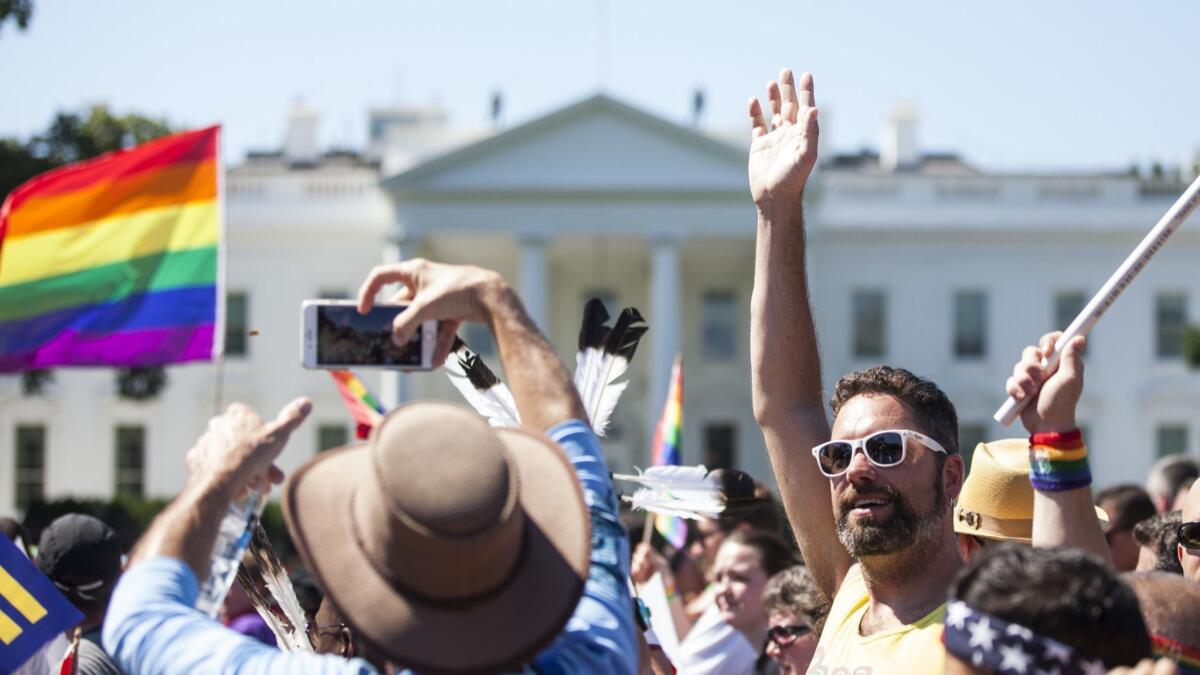Appeals court lets Trump’s military transgender ban stand while judge reconsiders case

- Share via
A San Francisco-based federal appeals court ordered a judge Friday to reconsider her ruling against President Trump’s decision to ban transgender people from the military.
In a unanimous, unsigned order, a three-judge panel of the U.S. 9th Circuit Court of Appeals told a federal district judge in the state of Washington to take into account executive privileges in reweighing her decision.
The U.S. Supreme Court put a hold on the judge’s nationwide injunction in January, allowing the ban to take effect while the government appealed to the 9th Circuit. Friday’s decision continued that hold.
LGBTQ rights lawyers who brought the case nevertheless said the ruling contained statements helpful to their challenge. The court held that the ban targets transgender people and must be analyzed through that lens.
“It also made clear that the district court was entitled to evaluate this discriminatory policy through a full presentation of the facts, which we are eager to make,” said Lambda Legal lawyer Sharon McGowan.
The case, which is being heard by Seattle-based District Judge Marsha J. Pechman, began with a challenge to a policy Trump announced on Twitter in 2017 that transgender people would no longer be allowed to serve in the military.
Pechman issued a nationwide preliminary injunction against that decision, ruling that it was not a well-considered military judgment.
The president later revoked the 2017 decision and replaced it with a policy based on a 44-page report that addressed a medical condition — gender dysphoria — rather than transgender status. That policy was issued by then-Secretary of Defense James N. Mattis.
The government asked Pechman to remove her injunction because the new policy differed from the first. She declined, and the government appealed to the 9th Circuit.
“Regardless of its overall effect, the 2018 Policy is significantly different from the 2017 Memorandum in both its creation and its specific provisions,” the 9th Circuit wrote Friday.
The 2018 policy followed a study by a panel of military experts that met 13 times over a period of 90 days, the judges noted, and “appears to have been the product of independent military judgment.”
“In short,” the panel wrote, “the district court must apply appropriate military deference to its evaluation of the 2018 Policy.”
The 9th Circuit also ordered the lower court to weigh executive privilege in reconsidering orders requiring the Trump administration to produce documents related to the policy. The power of the executive branch is not to be taken lightly, the panel reminded the judge.
“The military’s interest in full and frank communication about policymaking raises serious — although not insurmountable — national defense interests,” the court said.
The case was decided by 9th Circuit Judges Raymond C. Fisher, a Clinton appointee, and Richard R. Clifton and Consuelo M. Callahan, both appointed by George W. Bush.
Twitter: @mauradolan
More to Read
Sign up for Essential California
The most important California stories and recommendations in your inbox every morning.
You may occasionally receive promotional content from the Los Angeles Times.











